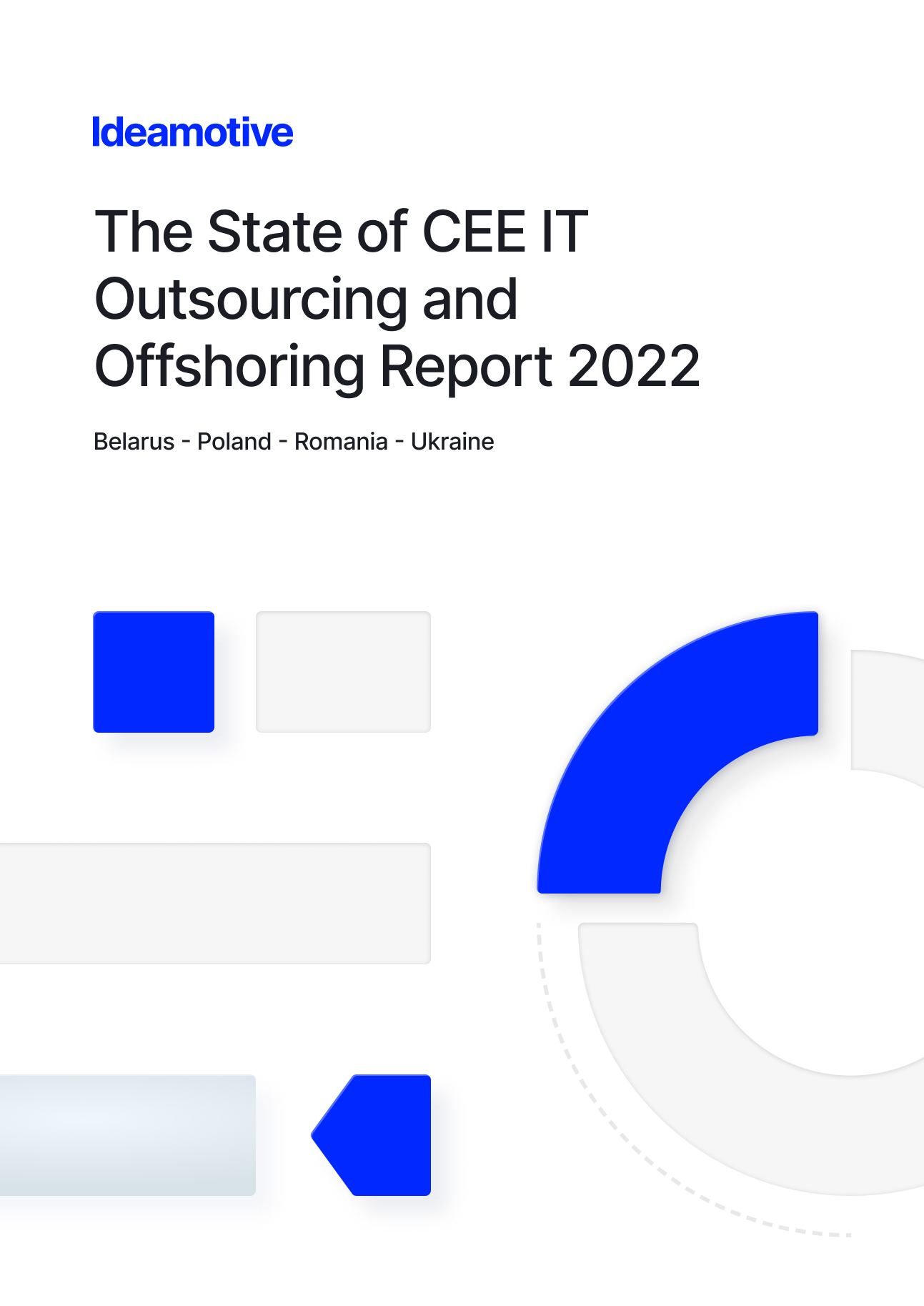The Hottest Silicon Valley Industries And Startups To Follow In 2023
Jan 12, 202315 min read

Michał Rejman
Chief Marketing Officer of Ideamotive. Travel addict and remote work advocate.

Have you heard about the name of the tech capital of the world? We give you 100 % that you will answer like this: "Oh, yeah, the hottest Silicon Valley industries and startups." It includes several independent, so-called "launch centers": San Jose, Palo Alto, Sunnyvale, Santa Clara, etc.
You will find the headquarters and offices of many well-known technology companies worldwide:
Visa, Alphabet, Uber, Netflix, and Apple. At the same time, Silicon Valley is a real factory for exciting new IT startups in Fintech, Regtech, Insuretech, Edtech, Medtech, Healthtech, and Blockchain. They use artificial and machine intelligence to cover the needs of their customers. We do not doubt that Silicon Valley is still at the leading edge of the tech industry.
Many places want to repeat the success story of the Bay Area and become Silicon Valley for their part of the world. Let it be Tel Aviv in the Middle East, Stockholm in Northern Europe, or New York in the USA.
The Bay Area's mature infrastructure, access to talented professionals (Software Consultants and Web Designers of the Bay Area!), and robust engineering tradition make it a prime spot for driving innovation. Despite the high operational costs, it's also a great place to start a new project. We will examine the list of startups in Silicon Valley.
Startups by industry
- Blockchain
- Fintech
- AI & Machine Learning
- Edtech
- Big data
- Medtech
- BiotechCybersecurity
- Internet of Things
- Drone technology
- Foodtech
- VR/AR
- Healthtech
How does Blockchain technology work?

Scientists from different fields of science worked together to make blockchain technology. In 2008, Blockchain appeared as a way to put bitcoin into circulation and manage cryptocurrencies.
Over the years, discoveries have made it possible to create a replicated, distributed database. Replication is the copying of information from one source to another. Changes in one instance automatically propagate to others.
Every user on the network can reach a consensus without having to trust anyone else. The ledger that keeps track of cryptocurrency transactions is based on technical innovations.
Blockchain builds the idea of independence from a particular supervisory authority or group of people. And the openness and transparency of the rules that cover technology work. Any system member can download the register and check that all payments and the creation of new blocks follow the rules and do not deviate from them.
We hear about blockchain mainly in the context of cryptocurrencies. Since bitcoin came out over ten years ago, blockchain technology has been used to solve many different problems. Blockchain is highly resistant to data manipulation (fraud) and may help with security issues. Therefore, blockchain technology has become popular among financial institutions. However, it may affect other industries as well. For example, with Blockchain, "micro-metering" and "micro-monetizing" are possible. In this case, it's important for creators who can now automatically earn their share from the work's distribution.
Wyre
Founders: Ioannis Giannaros, Michael Dunworth
Total funding amount: $29.1M
Year: 2013
Wyre wants to cause a revolution in the banking industry with its cutting-edge blockchain solutions. Founded in 2013, the startup uses proprietary blockchain technology to enable cross-border payments, reducing the time and expenses that usually come with banks and other financial institutions. Banks typically take up to 3 days and charge 4–6% for international money transfers. Wyre enables completing transactions in less than six hours and charges less than 1%.
![]()
Ripe.io
Founder: Raja Ramachandran
Total funding amount: $2.4M
Year: 2017
Ripe takes advantage of blockchain and the Internet of Things (IoT) to disrupt the area of the digital food supply chain. Thanks to their technology, users learn more about the quality of their food, its origin, and many more things that help them make informed choices and become more aware as consumers. But there are other technical benefits. Farmers can also use it to automate internal processes. Ripe lets you track and see your supply chain, gather and share data securely, and integrate blockchain, sensors, and the Internet of Things in a scalable way.
![]()
What you need to know about Fintech

Value: $127+ billion
Financial technology is a vast market. Experts forecast it to become even twice as big by 2024. It deals with things we all do: digital payments, personal finance, alternative financing, cryptocurrencies, and other digital cash alternatives. Fintech companies often make use of blockchain technologies. It's because of the data they collect about users and their fraud vulnerability. Since hackers might want to enter their databases, fintech companies must pay attention to security issues.
Productive
Founder: Jodi Shapiro
Total funding amount: $73M
Year: 2014
The Productive team wanted to come up with an innovative solution to increase the efficiency and effectiveness of business analytics. The company's final product will be innovative software that will give business owners a lot of chances to cut costs and improve performance simultaneously.
Productive will set up tools to compare different management solutions to each other to find the ones that will give you the most economic benefit with the least risk. Productive is a unique SAAS control platform that uses machine learning and artificial intelligence. In adapting to how a particular production company does business, the platform will learn about your team's unique experience, improving their skills.
![]()
Hourly
Founders: Amir Faintuch, Shay Litvak, Tom Sagi
Total funding amount: $34.2M
Year: 2018
Startup Hourly creates specialized software to improve the quality, efficiency, and automation of work tasks performed by HR and finance managers. In particular, the software lets you use a toolbar that helps keep an employee's timesheet and figure out their pay.
The built-in platform tools can also be used to automatically fill out and file tax returns and keep track of many other financial and accounting documents. In 2021–2022, the Hourly project managed to attract the interest of several large corporations at once, which used it to organize control over the workflow of remote employees.
![]()
Sparkling Logic
Founders: Carlos Serrano Morales, Carole-Ann Matignon, Davorin Kuchan
Total funding amount: N/A
Year: 2010
Sparkling Logic is a cloud-based SMART Decision Manager. It helps companies make smart business decisions using machine learning, business rules, and decision analytics.
Companies can extract maximum value from customer interactions through dynamic pricing. The application also covers risk management and compliance in the financial services industry. It helps to manage flash fraud for daily transactions.
Sparkling Logic also uses the Internet of Things (IoT) to remotely monitor the equipment with sensors in the energy and utility industries. The platform helps to value data insights, build predictive models, and write business rules. Measure and maximize decision quality using dashboards and decision analytics.
![]()
AI & Machine Learning

Value: $20 billion
Artificial Intelligence is something people are both fascinated about and afraid of. On the one hand, it may make some roles in the economy useless, but at the same time, it should produce more jobs. Many top tech companies in the bay area make use of AI. As part of IoT or mobile applications AI will learn and make UX improving over time. For example, it can be incredibly helpful for predictions. It can and is often used to detect possible fraud transactions. AI experts are among the most wanted tech specialists on the market. Lack of them is probably the only thing that can stop AI tech companies' development.
Nanonets
Founders: Prathamesh Juvatkar, Sarthak Jain
Total funding amount: $120K
This is a SaaS product and machine learning API that helps developers in building machine learning models for all kinds of solutions, including web app development. Software engineers who need to develop a model for identifying objects from sets can benefit a lot from Nanonets technology. The tool helps to increase the adoption of machine learning technology among businesses.
Amitree
Founders: Jonathan Aizen, Paul Knegten
Total funding amount: $19.5M
This tool uses artificial intelligence and machine learning to automate and optimize the real estate industry. Among others, the company released an intelligent assistant for real estate transactions called Folio – it automatically organizes essential transaction details for real estate agents.
EdCast
Founder: Karl Mehta
Total funding amount: $66.2M
This award-winning platform is used by Fortune 500 companies and government organizations all over the world to solve problems around the discovery, curation, and recommendation of content across external, internal, and tacit knowledge sources. The solution includes a Learning Experience Platform (LXP), SalesU sales enablement suite, and GuideMe, a multi-language in-app content authoring tool.
Big Data

Value: $56 billion
For many years people have known that there are sets of data that are way too large and/or too complex to analyze them the traditional way. We hope that there are answers hidden somewhere in our databases. Data engineers struggle to make the most sense of the data we have. However, without big data processing, the answers we seek are unavailable.
Take weather forecasting. An equation of variables in which one small change can completely alter the outcome. Thanks to the big data processing we finally can count on reliable long term forecasts.
AtScale
Founders: David P. Mariani, James Lai, Matthew Baird, Sarah Gerweck
Total funding amount: $95M
A giant among the Bay area startups, this data warehouse virtualization platform connects Business Intelligence tools to data platforms to enable smooth data migration without disrupting business users. It also helps to accelerate business analysis and define business metrics in one place to deliver consistent operational reporting.
DataGrail
Founders: Daniel Barber
Total funding amount: $9.2M
The age of privacy demands a new standard of transparency. DataGrail is the first dedicated privacy management platform that delivers ongoing compliance with GDPR, CCPA and more. The privacy platform integrates directly with over 150 business systems such as Salesforce, Adobe and Oracle, allowing businesses to discover and display personal data in seconds, rather than weeks or even months.
Based in San Francisco, California and founded in 2018 by Daniel Barber, DataGrail's direct integration enables companies to deploy a privacy request workflow in minutes and unify email settings across all customer-facing applications. Gartner named DataGrail Best Privacy Provider for 2020.
Fivetran
Founders: Logan Welley
Total funding amount: $163.1M
Fivetran fully automated connectors sync data from cloud applications, databases, event logs, and more to your data warehouse. Their integrations are designed for analysts who need centralized data but don't want to spend time maintaining their own pipelines or ETL systems. Its motto is “Focus on what really matters while driving analytics for your business.”
Medtech

Value: $1,000 billion
As you can see the Medtech industry is among those with the highest valuation. No surprise you will find top tech companies in the bay area developing medical solutions. Medtech companies deal with the development of technological solutions for medicine and medical care. While Biotech is a broader industry, Medtech is focused mainly on medical products and services. These products and services are often very close to the end-user (beneficent) and directly influence a patient's life. However, there are also many improvements in medical care in general. Medtech startups may develop various medical devices, new ways of diagnostics, more personalized and patient-centered solutions. If you’re looking for investment opportunities, look at these healthcare startups from the bay area:
Biomarker
Founder: Garrett Ruhland
Total funding amount: Not stated
Biomarker offers its users with real-time, data-driven access to health supplements. It measures symptoms, health metrics, and other contextual information to match consumers with the right nutritional supplements. Biomarker also measures how users respond to supplements to produce meaningful insights about their quality.
Nurx
Founders: Hans Gangeskar and Dr. Edvard Engesaeth
Total funding amount: $41.4M
This inspiring startup aims to improve women’s access to birth control via an easy-to-use application where they can order prescriptions and have it delivered right to their doorstep. Moreover, users can count on STI testing, herpes treatment, emergency contraception, HIV PREP and HPV screening. For users with health insurance, birth control is provided free of charge. Those without health insurance can benefit from plans that start at $15 per month.
Spring Discovery
Founder: Ben Kamens
Total funding amount: $22.3M
Spring Discovery wants to discover new therapies for aging. By targeting the processes of aging itself, the startup aims to uncover new therapies for the diseases of old age such as cardiovascular to neurodegenerative disease. Their machine learning platform accelerates experimentation for discovering such therapies to have consumers live long and healthy.
Biotech

Value: $490 billion
Biological technology aims at using molecular and cellular processes to improve people's lives. Biotech creates and develops technologies, services, and products that use biological systems or even living organisms. We, as people, need that because our habits are unhealthy, and we can use some help to make life better. Biotech includes branches like biopharmacy, bioinformatics, bioindustries so it can influence virtually all aspects of human life. Of course, we have a list of most interesting biotech startups in the bay area:
Biome Makers
Founders: Adrian Ferrero, Alberto Acedo
Total funding amount: $2.3M
Biome Makers is a biotech startup that specializes in everything there is to know about the microbiome. They use DNA sequencing technologies and proprietary Intelligent Computing systems to help users improve agricultural production and the quality of their products, reducing their reliance on chemicals and the impact of diseases.
ImpactVision
Founders: Abi Ramanan, Gustav Nipe
Total funding amount: $1.4M
This startup aims to build a more transparent and secure global food system through with the help of hyperspectral technology that combines the power of digital imaging with ‘spectroscopy’, a chemical technique. Users take a picture of the food and can understand its composition like nutritional content, level of freshness, proteins, fats, sugar, and moisture levels. It’s a non-invasive mechanism for assessing food quality during the production process, in real-time.
Notable Labs
Founders: Matt De Silva, Pete Quinzio
Total funding amount: $20.9M
Notable Labs is a drug testing service that aims to help oncologists identify the most appropriate treatment options for people with blood cancers. When De Silva’s father was diagnosed with brain cancer, he set out to revolutionize the way blood cancers are treated today with his venture. Doctors send collected a blood or bone marrow sample to Notable Labs which chooses a panel of FDA-approved drugs that have published anti-cancer effects, taking into account the patient’s diagnosis. The service then tests thousands of drug combinations on the sample and delivers a report of the results to the physician within just a few days.
Cybersecurity

Value: $143 Billion
With more and more devices connected to the Internet every year and a growing number of online services, the market needs to invest in security. Anything (computer, smartphone, car, fridge) connected to the Internet is vulnerable to hacking and fraud. Therefore, businesses need to prepare for hazardous security incidents. Even more challenges come with the spread of the Internet of Things, Fintech and Medtech solutions. To face these problems Cybersecurity experts work on technologies and processes that will defend our networks, devices, and privacy. Most interesting cybersecurity startups in the bay area are:
Balbix
Founder: Gaurav Banga
Total funding amount: $28.6M
Thanks to continuous predictive analysis and the use of AI, Balbix increases cybersecurity of companies and organizations. Balbix gives companies a chance to recognize and address security issues before the breach occurs. With user-friendly risk visualizations makes risk management easy to understand work with. Balbix offers ideas for improvement in an organization’s cybersecurity as well.
Bugcrowd
Founders: Casey Ellis, Chris Raethke, Sergei Belokamen
Total funding amount: $48.7M
This company takes the power of crowdsourcing and makes use of it to make companies more secure. What if you could hire hackers from all over the world to test your company's cyber security and help you improve it? This is something that Bugcrowd does for its customers. Now companies can avoid major data breaches and save awful lots of money with the help of international cybersecurity experts.
Zscaler
Founder: Jay Chaudhry
Total funding amount: $340M
Zscaler enables the world's leading organizations to securely transform their networks and applications to mobile and cloud. Its flagship services, Zscaler Internet Access and Zscaler Private Access, create fast and secure connections between users and applications, regardless of device, location or network. Zscaler's services are delivered entirely through the cloud and offer simplicity, increased security, and an improved user experience that traditional devices or hybrid solutions cannot match. Zscaler is used in more than 185 countries and operates the world's largest cloud security platform, protecting thousands of enterprises and government agencies from cyber attacks and data loss.
Internet of Things

Value: $161 billion
We can see the development of the Internet of Things on an everyday basis. Recently designed cars are connected to the Internet and are prepared to communicate with each other. Fridges of the future will order groceries online if you run out of favorite soda. Eventually, most of our devices will be connected in order to cooperate and improve our lives. People will get more personalized offers before they even know they need them. Thanks to technological development and almost unlimited human creativity, new IoT startups emerge on a regular basis.
Bright Machines
Founder: Amar Hanspal
Total funding amount: $179M
This startup aims at the elimination of human labor from the production of electronics. Bright Machines deliver solutions to build microfactories based on robots, IoT sensors, data analysis, process engineering, and machine learning. Thanks to the withdrawal of human labor devices can be produced faster, with fewer breaks and repetitive quality.
Ockam
Founders: Logan Jager, Matthew Gregory, Mrinal Wadhwa
Total funding amount: $5.2M
The aim of Ockam is to solve the problem of scalability and security of IoT systems. It offers a serverless platform for companies that build and develop distributed systems of interconnected devices. Security in IoT systems is crucial because only trusted applications and solutions will gain enough users to become profitable. All devices within a particular system built with Ockam can exchange secure messages ensuring the desired level of security.
Armis Security
Founders: N/A
Total funding amount: $112M
Armis's mission is to empower businesses to use new connected devices without fear of compromise from cyber attacks. What makes Armis unique and noteworthy is the rapidity of converting concepts into products and the successful track record of innovating in its platform. Armis is an enterprise-grade security platform that discovers devices on and off the network, continuously analyzes endpoint behavior to identify risks and attacks, and protects critical information and systems by identifying suspicious or malicious devices and quarantining them.
Drone Technology

Value: $10 billion
Drone technology is something more than just Unmanned Aerial Vehicles. There are Remotely Operated Underwater Vehicles and Unmanned Ground Vehicles as well. While the Drone Technology market is valued at about $10B, the global market for services may be worth 12 times more, according to PwC analysis. This is because drones can change almost every industry we know today. Starting from the construction industry, to defense and security, to emergency response and humanitarian aid, to healthcare. What's more, developing Drone Technology will bring also anti-drone technologies regarding security and privacy.
Swift Navigation
Founders: Colin Beighley, Fergus Noble, Timothy Harris
Total funding amount: $48.8M
Swift Navigation started as a GPS company. Today it not only provides low-cost and high-accuracy GPS receiver that makes positioning more accurate and affordable but also offers an ecosystem of positioning solutions that can be applied to the development of autonomous vehicles. Their solutions can be used for aerial drones, automotive vehicles (also fully autonomous) and more.
Zipline
Founders: Keenan Wyrobek, Keller Rinaudo, Will Hetzler
Total funding amount: $233M
Zipline combines advanced drone technology with Medtech. They secure people in need with on-demand delivery of vital medical supplies. Their technology works pretty much everywhere in the world complementing or even replacing traditional means of transport. The company ensures that their end-to-end storage and handling meets the highest medical standards. Battery-powered unmanned aerial vehicles are quick and small, therefore they can reach destinations directly. What's more, Zipline hires talents locally helping communities grow.
Wing
Founders: Andrew Branagh
Total funding amount: N/A
What if you could just use your phone to get something straight to you in minutes by air; faster, safer and with less carbon dioxide than if it were delivered to the ground? Wing is changing the future of delivery. They are an on-demand drone delivery service that can deliver food, medicine or other items within minutes.
They have also developed a drone motion control platform for safely moving drones across the sky. Wing’s services are faster, safer and produce less pollution than traditional shipping.
Originally established in 2012 at Factory X, Moonshot Factory, Wing is now an Alphabet company.
They are looking for curious, adventurous people who are highly motivated by unresolved problems. Wing come from different walks of life and share a passion for great ideas.
FoodTech

Value: $14 Billion
In the first half of 2020, the volume of investments in the global FoodTech market grew by 15.4% compared to the same period in 2019. These six months have shown that food delivery and super application platforms remain the most attractive in terms of volume for investors. In total, the companies concluded 331 deals for $8.6 billion.
Impossible Foods
Founders: N/A
Total funding amount: $1.4B
Impossible Foods is transforming the global food system by inventing the best way to make the meats and cheeses we love without using animals.
“We start by understanding what we love about the amazingly challenging experience of eating meat and dairy products, and then we explore the plant world to find and piece together specific proteins and nutrients to recreate the experience”,
their official website says.
Their mission is to provide food without compromise - tasty, healthy for people and healthy for the planet. The company was conceived and founded by renowned Stanford University professors with the backing of leading venture capitalists and visionaries.
Clear Labs
Founders: Sasan Amini, Mahni Ghorashi
Total funding amount: $63.5M
At Clear Labs, they are implementing significantly stricter food safety and quality programs through comprehensive genomic testing and advanced data research. The founders are confident that their product is a future of foodtech.
VR/AR

Value: $97B
Today the VR/AR industry is developing at a rapid pace, every day more and more interesting ideas are proposed, but not all of them reach implementation. Here are the three companies that are close to seeing their dreams becoming reality.
DigiLens
Founders: Jonathan Waldern
Total funding amount: $110M
DigiLens helps companies free information from the constraints of physical devices into a convenient and relevant place right in front of you, allowing you to interact more effectively with your environment. DigiLens, founded in 2003, has become a leader in waveguide HUDs used for AR and VR applications and wearable devices. Based on the revolutionary optical platform and photopolymer technology, they offer best-in-class solutions using a unique low-cost photopolymer and contact copier manufacturing process.
Niantic
Founders: Jerome Engel
Total funding amount: $470M
Niantic is the world's leading augmented reality technology company that inspires creative and exciting journeys into the real world. Their products inspire outdoor exploration, exercise and meaningful social interaction. Originally formed at Google in 2010, they became an independent company in 2014 with a strong group of investors including Nintendo, The Pokémon Company and Allp Louie Partners. Their current games include the groundbreaking global control game Ingress and the record-breaking augmented reality game Pokémon GO.
Unity Technologies
Founders: N/A
Total funding amount: $598.5M
Unity is the creator of the world's most widely used Real-Time 3D Development (RT3D) platform, providing content creators around the world with the tools to create a variety of 2D, 3D, VR and AR interactive experiences. Their 800+ engineering team keeps Unity at the cutting edge of technology, working with partners like Magic Leap, Google, Facebook, Oculus and Microsoft to provide optimized support for the latest releases and platforms. Apps built with Unity span 2.7 billion devices worldwide and have been installed over 24 billion times in the past 12 months.
HealthTech

Value: $218B
Health is the main trend in today’s world. Thereby, investors are taking more and more related startups under their wings. The two opposite poles of this area are solutions for personal and medical monitoring. And with the latter, product development is complicated by the sheer number of regulations and requirements of medical law that cannot be deviated from. On the other hand, devices are created that are similar in characteristics to professional ones, but for personal use.
Hello Heart
Founders: Maayan Cohen
Total funding amount: $23.2M
Hello Heart is a digital program that empowers people to understand and improve their heart health - the #1 cost factor for employers. The program is based on a clinical setting and is targeted at people with high blood pressure. Each participant receives a wireless blood pressure monitor and personalized advice in real time on their smartphone. The solution is easy to use and helps participants improve heart health in a fun and engaging way. Hello Heart delivers real results - coverage is 20-50% of targeted employees and 50% of at-risk members lower blood pressure.
Livongo
Founders: N/A
Total funding amount: $235M
Livongo empowers people with chronic diseases to live better and healthier lives. They help people stay healthy by starting with diabetes and hypertension prevention offerings, stimulating behavior change through a combination of consumer health technologies, personalized advice and real-time support at the point of impact.
Based on cutting-edge data science, the service creates personalized experiences for their members to get the right information, tools and support at the right time. The approach leads to better financial and clinical outcomes while creating a better experience for people with chronic conditions and their team of family, friends and healthcare professionals.
Lyra Health
Founders: N/A
Total funding amount: $235M
Lyra Health's mission is to transform mental health care with human-driven technology to provide more patients with the care they need, when they really require it.
Key takeaway
The tech scene of Silicon Valley is one with the most severe competition. Your tech solutions may be brilliant, but if they don’t solve any real problems or give other value to people, you lose. Just look at top tech companies in the bay area and how fierce is the competition.
If you think that you’re ready for this journey, we’ll keep our fingers crossed. However, we know that your startup might need something more than that. Maybe some highly specialized talents? IT experts? Business analysts? Project management specialists? They’re all pretty expensive, especially around the Silicon Valley, where so many companies compete every day. That’s where we can support your business with Ideamotive’s wide network of hundreds of technological and business specialists who will perfectly suit your startup needs.

Michał is a digital marketing veteran with a growth hacking mindset and 10+ years of experience. His goal is building high-quality technological content, with particular emphasis on React and Ruby on Rails. Traveler, climber, remote work advocate.
View all author posts
The State of Central & East Europe IT Outsourcing and Offshoring 2022 Report
Belarus • Poland • Romania • Ukraine
Read nowTrending articles
21 Dazzling Examples of Mobile App UI Design to Inspire You in 2023
Michał Pruciak 7 min read
MedTech vs HealthTech vs BioTech: What Are The Differences?
Michał Pruciak 7 min read
10 Business Applications of Neural Network (With Examples!)
Michał Pruciak 4 min read
10 Irresistible Examples of Web Design Best Practices for 2023
Adam Kozłowski 7 min read
21 Amazing Examples Of React Web Development
Michał Pruciak 14 min read

Looking for a specific type of business support service?
Rated 4.8 / 5.0 by clients from various industries and locations.





